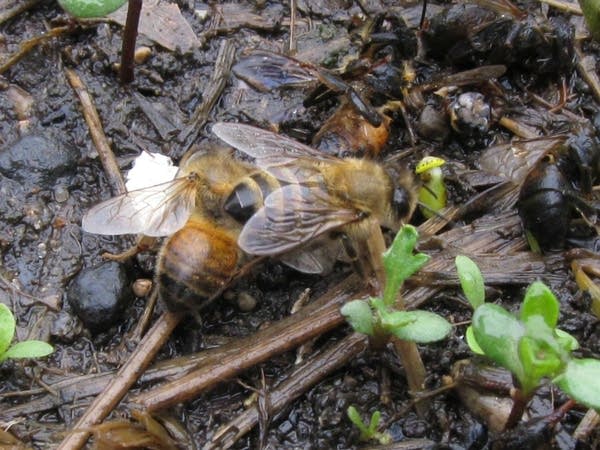MN beekeeper: Feds must tighten rules on insecticide-coated seeds

Go Deeper.
Create an account or log in to save stories.
Like this?
Thanks for liking this story! We have added it to a list of your favorite stories.
A new federal lawsuit led by a Minnesota beekeeper seeks to force the Environmental Protection Agency to label insecticide-coated seeds as a pesticide.
The change would curb use of neonicotinoid pesticides that beekeepers say are inadvertently killing their colonies. Neonicotinoids are widely used on corn and soybean seeds but are exempt from pesticide regulations.
Research shows the insecticide can harm bees and other beneficial insects. As the plant grows it takes up the insecticide along with nutrients and water.
That's effective for pest control because when a bug takes a bite of a plant it gets a dose of insecticide. But dust kicked up when the seeds are planted also carries the insecticide on the wind.
Turn Up Your Support
MPR News helps you turn down the noise and build shared understanding. Turn up your support for this public resource and keep trusted journalism accessible to all.
The insecticide-laden dust drifts onto hives and kills bees, said Jeff Anderson, a central Minnesota beekeeper and the lead plaintiff in the lawsuit filed Wednesday. "Spring and summer mortality that I have on my bees has just gone through the roof," he said.
But state or federal regulators can't protect his bees because the EPA says insecticide coated seeds are exempt from pesticide labels, Anderson added.
A pesticide label outlines any EPA restrictions on use and requirements for safe application.
"In order for state regulators to be able to take action there has to be a label and then a violation of the label," he said. "If there was a label then it would give our regulators the ability to take corrective action when that actually occurs."

Neonicotinoid insecticides sprayed on a field are regulated and labeled with restrictions on how they can be used, but seeds coated with neonicotinoids are not considered a pesticide use so they're exempt from the use rules, said Peter Jenkins, an attorney with the environmental advocacy group Center for Food Safety.
"The upshot of that is there's no mandatory labels, there's no mandatory warnings or use restrictions to mitigate the harms we know can happen from these seeds, and there's no enforcement," he said, adding that more than 150 million acres of farmland use treated seeds.
"EPA has created an exemption that is so big you could drive a Mack truck through it and allow this vast suite of environmental harms and bee kills and other sort of damage to occur without any oversight," he added.
Jenkins believes the "treated article" exemption led to an overuse of insecticide treated seeds because farmers are using insecticide even when there is no threat from insects.
The exemption also means the millions of pounds of insecticide used on treated seeds are not included in government analysis of pesticide use. The EPA says items such as paint or wood treated with pesticide don't need to be labeled as a pesticide because the pesticide only protects the treated item.
Those suing include beekeepers from Minnesota, South Dakota and Pennsylvania, the Pollinator Stewardship council, farmers from Kansas and Pennsylvania, the American Bird Conservancy, the Center for Food Safety, and the Pesticide Action Network. They want the EPA to regulate treated seeds the same as a pesticide, Jenkins said.
"If the insecticidal effect was really limited to the seed then maybe it would fit within the exemption," he added. "But, of course, it's not even intended to protect the seed, it's intended to protect the whole plant."
Jenkins said research shows the seed treatment can drift off of fields much like a pesticide sprayed on a crop.
An EPA risk assessment of one neonicotinoid, coincidentally released Wednesday, acknowledges dust from treated seeds can expose bees to the chemical, but dust was not part of the risk analysis. Instead EPA will "focus on mitigating risks from this exposure pathway through best management practices."
An EPA spokesperson said the agency typically does not comment on pending litigation.
Anderson said he's hopeful EPA will agree to labels and restrictions on neonicotinoid treated seeds.
"We can't survive very many more seasons with 50, 60, 70 percent losses," he said. "I've kept bees since getting out of high school in 1976 and that's what I've done and who I am. But it's a pretty tenuous situation right now."


